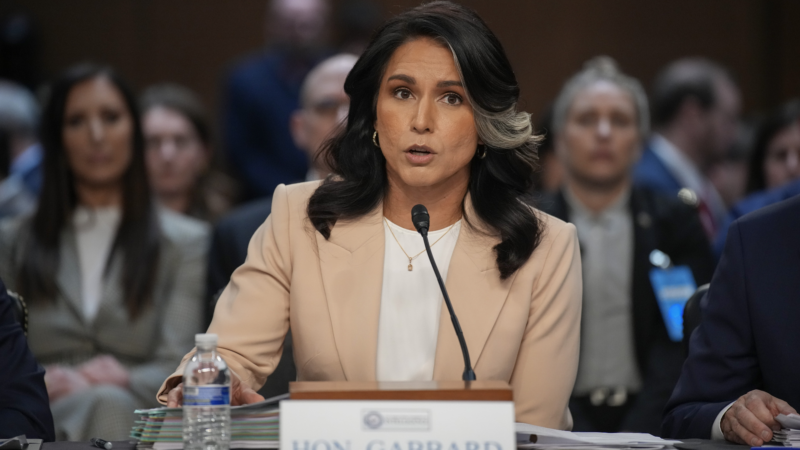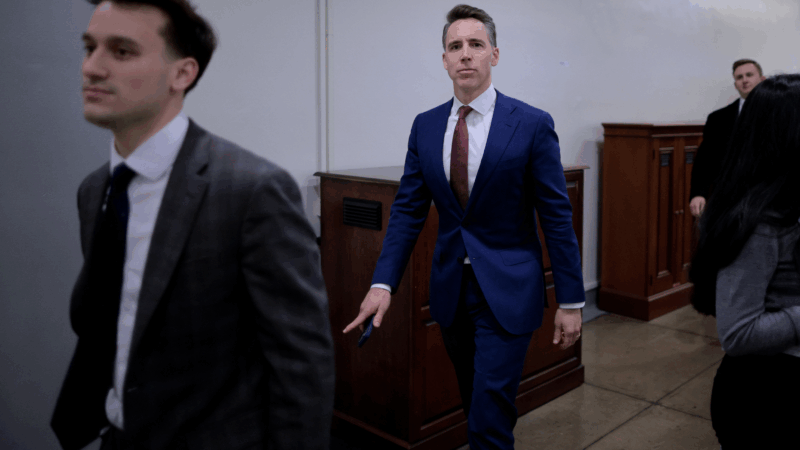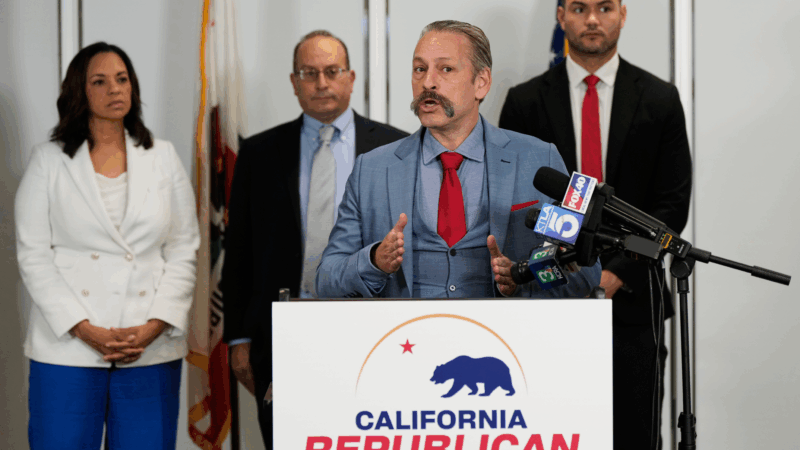In new assessment, Trump team ranks fentanyl as a top threat to U.S.
Fentanyl and international drug gangs responsible for smuggling the deadly street drug rank among the top threats to U.S. national security. That’s according to an assessment delivered on Tuesday by top Trump administration officials to members of the Senate Intelligence Committee.
“Cartels were largely responsible for the deaths of more than 54,000 U.S. citizens from synthetic opioids” during the 12-month period that ended in October 2024, Director of National Intelligence Tulsi Gabbard said during opening remarks.
The U.S Intelligence Community’s annual threat assessment for 2025, also released Tuesday, offered a slightly different number, estimating 52,000 U.S. deaths could be linked to cartel activity. NPR couldn’t independently verify either figure.
According to the Centers for Disease Control and Prevention, a total of roughly 84,000 people in the U.S. died during that time period from all overdoses linked to fentanyl, methamphetamines and other street drugs.
During Tuesday’s hearing, Sen. Tom Cotton (R-AR), who chairs the Intelligence Committee, noted that fentanyl has been elevated by the Trump administration as a top concern — ahead of other national security threats from countries such as Iran, North Korea and Russia.
“For the first time, the annual threat assessment lists foreign illicit drug actors as the very first threat to our country,” Cotton said, singling out “Mexican-based cartels using precursors [industrial chemicals] produced in China.”
The Trump team’s effort to focus on fentanyl was often overshadowed during Tuesday’s hearing by a growing scandal over the use of a civilian messaging app called Signal by administration officials planning a bombing mission in Yemen.
From public health crisis to national security threat

Fentanyl first began to spread as a street drug in the U.S. in 2012, displacing heroin and prescription pain pills as the most dangerous opioid sold by criminal gangs. During the first Trump administration, deaths spurred largely by fentanyl soared, rising more than 30 percent in 2020 alone.
The carnage caused by opioids has eased in recent years, with fatal overdoses declining more than 26 percent from the peak in 2023 through October of last year, according to the latest CDC data. The Biden administration focused much of its response to the crisis on public health measures.
But President Donald Trump has linked his tariff policies against Canada, China and Mexico to his concerns about fentanyl trafficking. Trump listed cartels as terrorist organizations for the first time in an executive order. He has also called for the death penalty for drug dealers.
Some Republican lawmakers including Rep. Greg Steube of Florida want the U.S. to launch military operations targeting drug organizations inside Mexico and elsewhere.
During Tuesday’s hearing, Sen. Cotton asked CIA Director John Ratcliffe whether China’s government is doing enough to stop exports of fentanyl-related chemicals used by drug gangs.
“No, there’s nothing to prevent China, the People’s Republic of China, from cracking down on fentanyl precursors,” Ratcliffe replied.
He said companies with ties to China’s Communist Party continue to play a significant role in illicit fentanyl production.
“There are more than six hundred PRC-related companies that produce those precursor chemicals in an industry that produces more than $1.5 trillion [in revenue],” Ratcliffe said.
Biden administration officials said last year they were making significant progress building international cooperation with China and Mexico aimed at disrupting the fentanyl supply chain and there is evidence fentanyl smuggling and overdose deaths declined.
But Ratcliffe described Chinese cooperation in fighting drug smuggling as “intermittent in nature and limited in nature.”
Drug policy experts generally acknowledge cartels and other drug gangs have contributed to the deadliest overdose epidemic in U.S. history, with companies in China and gangs in Mexico playing a significant role.
But many of these experts are skeptical about the Trump administration’s move to describe criminal smuggling operations in military, terrorist or national security terms.
“They’re looking at drug trafficking as if it’s done in a traditional kind of war-like manner,” said Regina LaBelle an expert on drug policy at Georgetown University, who served as temporary director of the White House Office of National Drug Control Policy during the Biden administration.
“You can’t bomb [drug gangs] out of existence. It’s a much more sophisticated complex type of effort,” LaBelle said.
She and others interviewed by NPR said they are concerned the Trump administration’s efforts could cause China, in particular, to scale back anti-narcotics cooperation.
Vanda Felbab-Brown, a drug policy expert at the Brookings Institution, noted that the Trump administration faces pressure to take the additional step of listing fentanyl as a weapon of mass destruction, which would put it in the same legal category as nuclear and biological weapons.
“If the Trump administration tries to accuse China of allowing WMD terrorism, or sponsoring WMD terrorism, this would further jeopardize the relationship,” Felbab-Brown said.
Felbab-Brown said the Trump team’s rapid moves to portray fentanyl as a national security or terror threat could also “create further political if not legal atmosphere for U.S. military air strikes into Mexico.”
Trump administration rolls back $2 billion mental health, addiction grant cuts
Sweeping cuts to mental health and addiction programs worth more than $2 billion are being reversed. After a political backlash from Republicans and Democrats, the grant money will be restored.
Senate Republicans block Venezuela war powers resolution
The resolution would have forced President Trump to get authorization from Congress before launching military operations in Venezuela. It was blocked after having previously advanced with GOP support.
U.S. to suspend immigrant visas from 75 countries over public assistance concerns
The State Department says it will suspend the processing of immigrant visas for citizens of 75 countries whose nationals are deemed likely to require public assistance while living in the United States.
In a win for Democrats, court allows California’s redistricting plan to proceed
In November, California voters approved a new congressional map that could help Democrats win five more House seats and counter the Republican redistricting that President Trump has prompted in other states.
‘Stranger Things’ brings Prince and Fleetwood Mac back to the charts
Netflix's Stranger Things finale, which dropped Dec. 31, is shaking up the Billboard Hot 100.
Denmark says there’s a ‘fundamental disagreement’ with Trump over Greenland
The two sides agreed to create a working group to discuss ways to work through differences as President Trump continues to call for a U.S. takeover of Denmark's Arctic territory of Greenland.






